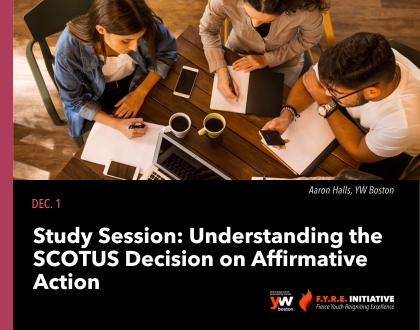
December 1, 2023
By: Aaron Halls
Study Session: Understanding the SCOTUS Decision on Affirmative Action
When the Supreme Court of the United States (SCOTUS) overturned affirmative action in college admissions in June, it prompted an understandable anxiety that still pulses throughout the veins of the country. Due to affirmative action, admission programs at colleges and universities could consider race as a factor during the admission of students to help create more diverse campuses. In the aftermath of SCOTUS’ decision, it can be easy to feel overwhelmed or confused about what this all means, especially if you’re in middle school or high school.
YW Boston’s Advocacy Committee was recently joined by Michael Kippins, a litigation fellow at Lawyers for Civil Rights, an organization that provides free legal services to those in need and fights against inequality. In his role, Kippins typically focuses on higher education, employment, and immigration. While talking to YW Boston, he gave a helpful and clear overview of the Supreme Court decision regarding affirmative action and its application and provided some advice that could be helpful for our F.Y.R.E. initiative participants who are starting to think about applying to colleges.
Q: What happened with the United States Supreme Court’s decision on affirmative action this past June?
A: Students for Fair Admissions sued Harvard University and The University of North Carolina at Chapel Hill (UNC) with the belief that the affirmative action processes they utilized in considering race as part of admissions were discriminatory. With a 6-3 vote in the UNC case and 6-2 vote in the Harvard University case, on June 29, 2023, the Supreme Court overruled previous precedent that allowed schools like Harvard to have a certain admissions process in using race as a factor during school admissions for students.
The Supreme Court ultimately determined that race could not be used as or considered as a factor in the admissions process in the way that it had previously been. So, in other words, in terms of checking that box, it could not then be an indicator of whether you received a plus factor on your application.
Q: Is the consideration of race in the college and university application process truly gone?
A: Despite the Supreme Court ruling, colleges and universities still have a way to consider how a person’s experience with race has affected their life. As mentioned by Chief Justice John Roberts in the majority opinion, “Nothing in this opinion should be construed as prohibiting universities from considering an applicant’s discussion of how race affected his or her life, be it through discrimination, inspiration, or otherwise.”
I’m sure you’ve seen many headlines or many discussions saying, “Affirmative action is dead,” “Affirmative action can’t be used,” “Affirmative action no longer exists, right?” We [at Lawyers for Civil Rights] don’t agree with that. Part of the reason why is that there’s still a window open for colleges and universities to consider a person’s experience with race — the idea being that a person’s experience with race is individualized.
The school should be able to look at, as one consideration among many others, whether your race has had an impact on your experience and how that impact is affecting your candidacy for admission.
Q: If I wanted to talk about my racial identity during my college or university application process, how might I go about that?
A: If you were a student who led your Black student union in your high school, now you may not be able to just check a box and receive a plus factor that says that your race is automatically a bonus to you. Instead, what you can emphasize in your essays and your applications is that your experience having led the Black Student Union is twofold.
One, it shows that I have leadership qualities. And two, it shows my interest in learning more about my race, learning more about what people of my race experience, how there are ways to maybe innovate, or maybe what ways there are to come together and solve some of the systemic issues that are traditional or historical, for people of that race.
Q: Why is it important for people to know about the SCOTUS decision on affirmative action?
A: It’s important to know that that option exists. It’s important for schools to know. It’s important for teachers to know. It’s important for community groups like YW Boston to know. [This is so that] they are encouraging people who are applicants, or are about to apply, to emphasize these things in their applications if that’s something they feel, defines part of their experience and would be helpful for the university or college to know.
We want to thank Michael Kippins for taking the time to speak with YW Boston and allowing us to share his insight.
About YW Boston’s Advocacy work:
YW Boston works to eliminate racism and empower women through DEI services and advocacy. Our advocacy work is included under our 501(c)3, which means we do not endorse candidates, and we are non-partisan in the policies that we take on. Our advocacy work is planned and executed by a dedicated group of volunteers who apply and serve on our YW Boston Advocacy Committee.
About YW Boston’s F.Y.R.E. program:
The F.Y.R.E Initiative is an empowerment and leadership program for middle school girls, inclusive of trans and gender non-conforming students, within the Greater Boston area. It is an in-school and after-school program that uses dialogue and experiential learning through a curriculum that focuses on positive self-identity and social emotional skills, as well as social justice and civic engagement.

